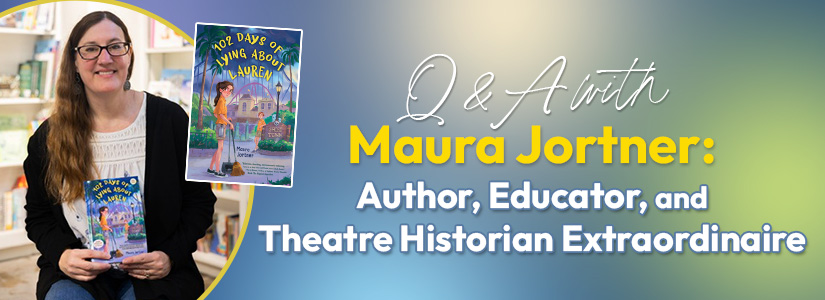Q & A with Maura Jortner


Maura Jortner is an author, educator, theatre extraordinaire, former puppeteer, lover of Disney World and Dole Whip, a mother, a wife, and an inspiring advocate for kindness. She is currently a literature and creative writing professor at Baylor University, holding both a bachelor's degree and master’s degree in literature, and a PhD in theatre history. During Maura’s interview, she explores the autonomy of names and identity, encourages us to look for a hidden figure on her book cover, and gets real about the messiness of life, love, family, and companionship.
“We all mess up from time to time,” Maura said. “We all make mistakes, and that’s just what makes us human, however, we must also repair our mistakes and fix what we have broken. That’s another part of being human: we must work to make things right.”
Read on to learn more about a special Cat-and-Mouse game, the life rule that Maura lives by, and why middle school novels deserve to be filled with difficult—yet authentic—themes.
Q: 102 Days of Lying About Lauren explores some heavy themes including whether love is earned or unconditional, familial bonds and ties, the courage of perseverance, the loss of a loved one, the process of grieving and healing—just to name a few. Why is it so important that we create these powerful, yet sometimes sad, stories for a younger audience?
A: I read to my kids all the time—but I remember reading most to my oldest—and sometimes we would be reading a book and I would have to put it down because I was crying. I’d ask my daughter to take over when I needed a break, and that made me only want to read fun and adventurous stories with my daughter, because I couldn’t cry every night, right?
*chuckles*
That’s when I understood that middle grade had such a special space for tough topics; it’s that time of life when kids are becoming real people with their own ideas and expressing their autonomy in different ways. This audience is searching for ways to become individuals, and they must ask themselves, “Who am I? What person do I want to be? What’s my background like? How can I connect with others? What makes me different and unique?” I watch my youngest daughter battle with these questions, trying to figure out who she is and how she fits into the world. I think these are important subjects for middle schoolers to explore, and that’s exactly what my character Mouse is doing throughout the book. Middle school is such a cool genre because people think deeply about that time in their lives.
Q: The characters in your book view and feel love in different ways; do you believe that love is conditional, or must it be earned? Are there grey areas?
A: This is tough, right? I feel like some love is unquestionably unconditional, like the love I have for my children and husband; they couldn't do anything that would make me not love them. I will say however, that this is a question that I have struggled with because I feel like with certain people in my life, their love needs to be earned. I think it differs based on the relationship you have with the person: Is it love for a friend or love for a lesser-seen family member?
Q: The setting of your story is so realistic—I wanted to jump on a ride while reading your book! What inspired you to set this story at an amusement park?
A: Flashback to March of 2020—do you remember that time? Of course, we all remember that time: the world shuts down, everyone shifts to online learning, we’re all scared out of our minds… Well, right before that, I was at Disney World! We took the family there for our Spring Break and I remember distinctly that I was having a blast in “Fantasy Land” when I got an email from Baylor University (where both my husband and I teach) saying that our campus was shutting down, they were extending our Spring Break and—surprise—everyone will teach and learn online. What a time! My husband and I were so surprised, we just kept questioning what was happening. We asked each other, “Has the world gone crazy?” I mean, we’re at Disney World—the most magical place on the planet—this can’t be true. But it was true, and only two days after we returned home from our trip, Disney World (along with the rest of the world) shut down.
I kept walking around my neighborhood—really, what more could you do during that time? —and just longed to go back to that trip, when everything was normal, and I was having a blast with my family. I didn’t want to be at home, confined to Texas—I wanted to be in Disney World! I kept thinking of my favorite ride, The Haunted Mansion, and thought, “What if a kid lived in here?” So that’s where my inspiration came from: Disney World and a pandemic.
Q: Do you have any favorite park rides or snacks?
A: As far as rides go, I'm always down for a haunted house, and at Disney World, the Haunted Mansion is my favorite. But I have others that I really enjoy, too. For instance, I love the Buzz Lightyear ride (you know, the one where you point your controller at monsters and space aliens for points--I beat my husband by a mere 10 points!) and the PeopleMover. That’s more my speed. It might be underrated, but it’s Maura-speed. In theory, I’m a terrible person for amusement parks because I don't really like roller coasters; I get motion sickness and I’m scared of heights. I really shouldn’t like amusement parks, but I do—I adore them. I love the atmosphere and I feel relaxed when I’m there.
Snacks… let’s see… any snack really! I don’t have a favorite—I don’t discriminate between snacks. If we’re talking about Disney World specifically, I really love the Mickey-shaped hot pretzels because, well, what’s not to love about that? I also have a STRONG love for Dole Whip! It’s so good! I’ll be honest, if it’s a snack, I’ll eat it!
Q: Throughout the story, you compare Lauren’s family to Tanner’s family, illustrating that Lauren’s mom has little money to spare, and has a hard time keeping a job and feeding Lauren while Tanner’s family has the exact opposite: large sums of money, careers that require higher education, a large home, etc. Who do you think has “less” in this situation? Can we really measure our misfortunes in life, pinning one trauma against the other?
A: One thing that I've noticed while reading a lot of middle school and YA books is that they show the different ways in which we all suffer, because that’s what being human is all about—right? So, a lot of books have characters that suffer, but I don’t think it’s fair to say that only people who are poor suffer or only people who are rich suffer; there are all different types of suffering in this world, and they’re all real and valid. I wouldn’t be comfortable saying that Mouse has it worse than Tanner or vice versa, because they both have different life experiences and at the end of the day, they are both hurting. Tanner’s family, for example, might have plenty of money, but that doesn’t mean he has it easy; he constantly seeks his parents’ love and forgiveness, but he never feels like he attains it. Readers might look at Tanner and think that his family has a bunch of money, they can just buy their happiness, but that isn’t always the case—that’s not going to bring back his sister. Tanner is certainly suffering, but so is Mouse. Poor Mouse has been suffering for quite a while because she seeks her mom, her mom’s love and acceptance, a stable home, etc. Tanner and Mouse both suffer, but they also learn how to be there for each other in different ways. Their stories are hard, and they are real. I think anyone reading this book can relate to their suffering or sympathize with or empathize with their situations. We all go through things, we all suffer, and having some type of support system can help us get through these times.
Q: Lauren continuously bounces back and forth between the rules she has governed for herself, and by the end of the book, her rules morph into lessons that she has learned throughout her experience living at the amusement park. Do you have life rules? Have they changed over time?
A: I do have life rules, and they have absolutely changed over time! I am a completely different person than I was fifteen years ago, and I feel like that’s a part of being human—we change over time, and that’s okay, that should be expected. We change as the world gets to us or wears us down or impacts us somehow. One rule that I try to live by—no matter who I am dealing with or whatever the circumstance may be—I just try to be kind. If we could all live by this simple truth, the world would be a more loving place. The act of kindness is something that we can all express in our own ways. None of us are perfect, but we can always try to be kind.
Q: While Tanner feels lonely throughout the story, Lauren is actually living all alone; is there a difference between feeling alone and being alone?
A: My mind initially jumps to my eldest daughter, who is very much an introvert. For her, being alone is perfect—that’s how she processes things—and she often needs time alone to think things over. So, an answer to this question might vary depending on one’s temperament. For me at least, I fall right in the middle of being an introvert and an extrovert; being alone doesn’t bother me and being around people doesn’t bother me either, but I think that I’d rather be alone than feel lonely. I think about being in a crowded space where no one understands me, and that makes me feel uncomfortable and sad—it sounds like 0% fun. Think about Mouse, she is alone, but she has Leggy and Tanner to lean on, so she might not feel lonely all the time. She does her best to find friends around her, but she must feel alone at times. Mouse is so persistent and doesn’t always give into being alone or feeling lonely; she does her best to turn things around.
Q: At the end of the book, the social worker asks the main character whether she would like to be called Mouse or Lauren; why are our names such an imperative part of our identity and autonomy? What lesson do you hope readers take away from this scene and how can they apply it to their everyday lives?
A: We start this story with a kid (Mouse) who tells us that Lauren is dead, but that’s a lie—she is Lauren—and she doesn’t tell anyone her real name. By the end of the book, however, she’s not only telling people who she is, but she is claiming her name—that’s really powerful. I thought about how I could give this character agency and illustrate their character arc or growth, and one way to do that was by playing around with themes of identity. One of Lauren’s “New Rules to Live By” at the end of the book is, “Be ready to go back to who you once were, if it seems like that’s who you are again.” I wanted to give this character the opportunity to claim her own identity and not be trapped in a scenario where adults force her into an old identity; she, among everyone else in this world, deserves the power to be whoever she wants to be.
Kids at Lauren’s age are really struggling with their identities and trying to make sense of how they fit into the world, so when they can claim their own name, they start to discover more about themselves. I was thrilled when my daughter asked us to start calling her by a new nickname last year; she was learning more and more about herself, and she wanted me to be a part of that exploration. So, when Lauren claims her name at the end of the book, it’s a very pivotal moment where you learn that she’s going to keep moving forward in life, she’s going to persist and be Lauren, even if it’s hard and brings back stinging memories. Lauren is incredible—I just love that girl.
Q: Tanner is struggling while grieving the death of his sister—is there any right or wrong way to grieve?
A: Grief is tough, isn't it? My dad died in July of 2020, and so grief is something I’ve been living through and thinking about. It’s different for everyone, and we experience grief differently at various stages of life. When my dad died, it was very sad, yet I am an adult who understands that death is a part of life…it’s just how things go. Overtime, I’ve grown into that understanding, and it’s a truth that I wouldn’t expect Tanner to feel the same way about. Tanner is sixteen, and I couldn’t imagine being in his shoes and losing a sibling; it’s heartbreaking. I feel so bad for Tanner and the guilt he carries. We all grieve differently, and having a support system is imperative to our health.
Q: Mouse has a hard time asking for help, —as most of us do in life—but by the end of the book, Mouse asks Cat, Nalo, and the others for help. Why is it so important that we ask for help, even when it’s difficult to muster the courage to do so? What can we learn from Mouse’s vulnerability and the way she deicides to navigate her tough situation?
A: I think we all want to be our own heroes—we want to be strong for ourselves—and it can be so hard to ask for help, but it is better when we ask for help. I have a group of female friends that play such strong roles in my life, friends that I can reach out to for help, support, or advice. Sometimes I call them and ask, “Hey, could we get together soon?” I use our time together to let them know what’s going on in my life, if I’m struggling with something, or if I just need to vent. They are supportive and show me grace. This is one of my support systems; they are people I trust and go to when I need help.
I actually think this concept of asking for help is similar to my life rule of being kind; the world would undoubtedly be a better place if we could all open up with each other and be vulnerable. There are times when we should say, “I’m struggling here, can you please help me?” I really hope my readers take away that message from reading 102 Days of Lying About Lauren. Lauren is so positive and persistent and shows us that even when things are hard, we must keep going and ask for help along the way. Lauren always tries to stay positive, even when battling with such sadness in her life, but readers will see her stronger than ever at the end of the book.
Q: What’s next for you/ your writing career? (Initiating drumroll…)
A: I'm excited to share that I’ve recently signed a new book contract with Holiday House and Sally Morgridge, the same editor that I worked with for 102 Days of Lying About Lauren! My new book is called Keepers of the Marsh and is set in Galveston, Texas. My husband and I love to vacation in Galveston, so maybe I drew inspiration from our travels… in fact, many of our travels help spark my inspiration! I guess I’ll have to vacation more… Anyways, my new book has a little bit of magic in it—look out for a witch! —but it still covers some pretty deep and complex topics. I wrote this book for a middle school audience, and it should be released in 2025.
When I’m writing a new book, I think about what Stephen King said: “The first draft of a book—even a long one—should take no more than three months, the length of a season.” That’s exactly what I strive for, writing one book every season (or every semester in my case). When I commit to writing a book, I commit to one thousand words a day, which looks like a lot until you think—on average—a page is two hundred and fifty words, so that’s only four pages a day. If you follow my rule, at the end of two months, you’ll have a full draft (middle school books should be around sixty thousand words, maybe a little under). This writing schedule is completely workable for me.
P.S. I want to give a special shout out to my editor who surprised me by hiding something special on my book cover! Make sure that your readers look closely, and they might be able to spot a cat, a cousin, or both! Afterall, this book includes a special Cat-and-Mouse game!
102 Days of Lying About Lauren by Maura Jortner is an Upper Elementary and Middle Plus book scheduled for your October 2023 Book Box! Make sure to keep an eye out for this special title and select it for your library! If you are interested in JLG’s Middle School book categories, click here or schedule a call with our curation specialists to learn more about becoming a JLG member!









